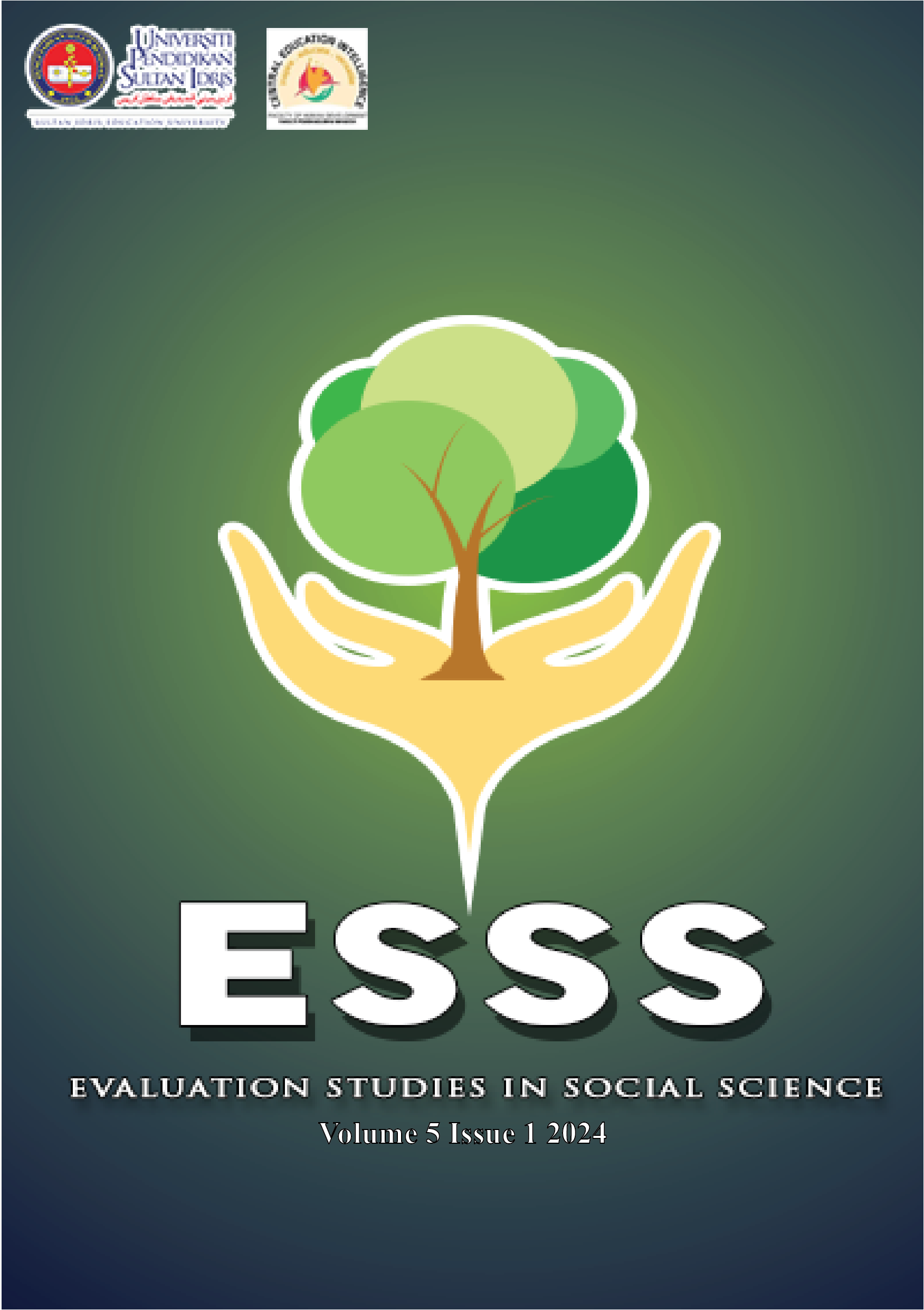Evaluating The Result of Work-Based Learning Teaching Model at RISE@UPSI
DOI:
https://doi.org/10.37134/esss.vol5.1.9.2024Keywords:
Andragogy, Adult learning, Malcolm Knowles' Theory, Work Base LearningAbstract
This work-based learning has gained significant attention in the field of education as a way to bridge the gap between theoretical knowledge of Malcolm Knowles' Theory and practical application. This article provides an overview of the evaluation of work-based learning at the Research Management and Innovation Centre Universiti Pendidikan Sultan Idris (RMIC-UPSI) under the umbrella of the Research, Innovation, Society and Entrepreneurship unit (RISE). This evaluation aims to synthesize existing literature and studies, summarize relevant information, and analyze available evidence to determine the current state of work-based learning at RMIC-UPSI. The evaluation focuses on the integration of work-based learning within the postgraduate students enrolled in the Business Strategic Management course at UPSI. It explores the impact of work-based learning on students' abilities to integrate their academic and work-related experiences, as well as the development of skills and competencies required in the business management sector. The evaluation also examines the effectiveness of work-based learning interventions in terms of their impact on students' performance. Based on the review of 8 enrolled students, it is found that all of them show good performance in which studies demonstrate a positive impact. Overall, this evaluation of work-based learning at UPSI provides valuable insights into the integration and effectiveness of this learning approach. The evaluation of work-based learning at UPSI aims to determine the current state of integration and effectiveness of this learning approach. It emphasizes the need for further research and evaluation to fully understand the relationships among workplace learning environments, learning strategies, and learning outcomes in the TVET context at UPSI.
Downloads
References
Abendan, C. F., Kilag, O. K., Taping, M. L., Poloyapoy, G., Echavez, R., & Suba-an, H. M. (2023). Driving Excellence in Management Education through IT Innovation. Excellencia: International Multi-disciplinary Journal of Education (2994-9521), 1(4), 62-75.
Ahmad, A. M., Hussain, K., Ekiz, E., & Tang, T. (2020). Work-based learning: an approach towards entrepreneurial advancement. Worldwide Hospitality and Tourism Themes, 12(2), 127-135.
Bredeweg, B., & Kragten, M. (2022). Requirements and challenges for hybrid intelligence: A case-study in education [Original Research]. Frontiers in Artificial Intelligence, 5. https://doi.org/10.3389/frai.2022.891630
Brook, C., & Corbridge, M. (2016). Work-based learning in a business school context: Artefacts, contracts, learning and challenges. Higher Education, Skills and Work-Based Learning, 6(3), 249-260.
Dogara, G., Saud, M. S. B., & Kamin, Y. B. (2020). Work-based learning conceptual framework for effective incorporation of soft skills among students of vocational and technical institutions. IEEE Access, 8, 211642-211652.
Dornan, T. (2021). Communication, knowing and being in work-based learning. In Work-Based Learning in Clinical Settings (pp. 207-217). CRC Press.
Evans, M., & Cloutier, L. M. (2023). Integrating higher degree education with practice: exploring the value proposition of executive MBA apprenticeships. Higher Education, Skills and Work-Based Learning, 13(2), 283-298.
Feldmann, L. (2016). Considerations in the design of WBL settings to enhance students’ employability: A synthesis of individual and contextual perspectives. Higher Education, Skills and Work-Based Learning, 6(2), 131-145.
Fergusson, L., & van der Laan, L. (2021). Work+ learning: unpacking the agglomerated use of pedagogical terms. Journal of Work-Applied Management, 13(2), 302-314.
Kanapathy, K., Jamal, M., Pranchis, R. K. M., & Venkatachalapathy, V. (2023). A Critical Analysis on Universiti Pendidikan Sultan Idris Tamil Unit Student-Teacher Teaching Practice Experiences: A New Case Study Approach. Evaluation Studies in Social Sciences, 4(2), 7-18.
Lubbe, I., & Svensson, G. (2022). Work Integrated Learning (WIL) model-A win-win process between university, postgraduate business students and industry. The Independent Journal of Teaching and Learning, 17(1), 39-59.
Manubag, M., Kilag, O. K., Peñalosa, B., Timtim, J. M., Padilla, J. B., & Abendan, C. F. (2023). Empowering Skills Development: Exploring the Role of Technology Management in Technical Vocational Education Enhancement. Excellencia: International Multi-disciplinary Journal of Education (2994-9521), 1(5), 195-208.
McGaha-Martin, K. D. (2023). Impact of Work Based Learning on Employability Skills of High School Students Arkansas State University].
Morley, D. A., & Jamil, M. G. (2021). Introduction: Real world learning—recalibrating the higher education response towards application to lifelong learning and diverse career paths. Applied Pedagogies for Higher Education: Real World Learning and Innovation across the Curriculum, 1-17.
Murtazin, K., Shvets, O., & Piho, G. (2020). Literature review on work-based learning. 2020 IEEE Frontiers in Education conference (FIE),
Nallaluthan, K., Masran, M. N., Thurasingam, V., & Kanapathy, K. (2023). Malcolm Knowles' Theory of Andragogy at Research Management and Innovation Centre Universiti Pendidikan Sultan Idris (RMIC-UPSI): Work-Based Learning Model. Evaluation Studies in Social Sciences, 4(2), 30-50.
Nottingham, P. M. (2017). Re-evaluating work-based learning pedagogy. Higher Education, Skills and Work-Based Learning, 7(2), 129-140.
Perrin, D., Simpson, D., Meakin, D., Rowe, L., Mirza, N., Beckett, K., Scowcroft, S., Hadfield, P., Graham, S., & Ions, K. (2020). The work-based learning student handbook. Bloomsbury Publishing.
Plasman, J., & Thompson, C. (2023). The value of informal learning within work‐based learning: The economic benefits of WBL. International Journal of Training and Development, 27(3-4), 305-326.
Rose, P. (2020). Work-integrated learning in context: A South Korean perspective. International Journal of Work-Integrated Learning, 21(2), 131-143.
Salim, M., Annua, A. N., Yusoh, N. F. M., & Tan, N. Z. (2022). Assessing The Achievement of Program Educational Objectives: Alumni Surveys. Evaluation Studies in Social Sciences, 3(2), 35-42.
Song, Y., Wang, T., Cai, P., Mondal, S. K., & Sahoo, J. P. (2023). A comprehensive survey of few-shot learning: Evolution, applications, challenges, and opportunities. ACM Computing Surveys, 55(13s), 1-40.
Urquía-Grande, E., & Perez Estebanez, R. (2020). Bridging the gaps between higher education and the business world: internships in a faculty of economics and business. Education+ Training, 63(3), 490-509.
Downloads
Published
How to Cite
Issue
Section
License
Copyright (c) 2024 Kesavan Nallaluthan, Md Nasir bin Masran, Premila Subramanium, Irdayanti Mat Nashir, Mazlan Zainal, Subramaniam Kolandan, Devaki Narayanan

This work is licensed under a Creative Commons Attribution-NonCommercial-ShareAlike 4.0 International License.





